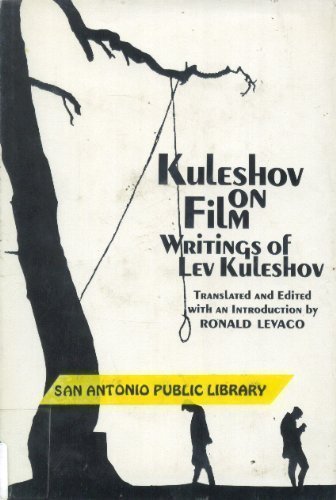Kuleshov on Film: Writings by Lev Kuleshov pdf download
Par edelman amanda le mardi, juin 28 2016, 12:57 - Lien permanent
Kuleshov on Film: Writings by Lev Kuleshov by Lev Vladimirovich Kuleshov, Ronald Levaco


Kuleshov on Film: Writings by Lev Kuleshov Lev Vladimirovich Kuleshov, Ronald Levaco ebook
ISBN: 0520026594, 9780520026599
Format: pdf
Page: 121
Publisher: Univ of California Pr
She explains it this way: "Lev Kuleshov, a Russian filmaker, edited a short film using static images of an actor's face alternated with shots of a plate of soup, a girl at play, and a coffin. In this classic interview with Alfred Hitchcock he demonstrates the Kuleshov Effect. Among aficionados of early silent films, Lev Kuleshov, the Soviet film director, is known for his use of editing to evoke different emotions. If I can make one conclusion from the two films I've seen of Lev Kuleshov, it's that he isn't the least bit afraid to wear the influence of America on his sleeve. In order to proceed with basic film techniques I felt that a short exposition on the 'Kuleshov effect' was required. Sergei Eisenstein and Vsevolod Pudovkin are his students and had develop his theories of montage editing. Lev Kuleshov The founder of the world's first film school and he is very first film theorist for Soviet Montage. He also started moving the cameras. The 'Kuleshov effect' refers to the Soviet filmmaker Lev Kuleshov who saw editing and film as an art form. As a lifelong film geek and a current programmer for the Seattle International Film Festival, I've seen the good, the bad, and the ugly (generally, as well as the Sergio Leone classic). This is a film editing montage effect named after Russian filmmaker Lev Kuleshov who first illustrated it in the 1910s and 1920s. Source: http://www.imdb.com/name/nm0474487/bio : accessed on 12/9/2012. West in the Land of the Bolsheviks (1924) is still dead-on. Some are too long, others are thankfully brief, but they all employ classical film narrative techniques to some degree. There was a lot more action in this film and he followed the action throughout the story. For instance, Russian filmmaker Lev Kuleshov developed early theories on the effect of editing and the juxtaposition of images in sequence. Yet the anti-American satire of Lev Kuleshov's The Extraordinary Adventures of Mr. After seeing the montage, that would change the perception, or increase the emotion that a reader imagines? It has to do with context and editing, and how the placement of images can affect perception.